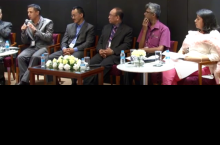This video covers Session 3 of the conference entitled “Entry Points for Gender Equality and Social Inclusion (GESI) Mainstreaming.” It draws out the various experiences of the speakers in these four mainstreaming aspects: (i) creating community development strategies for risk mitigation of large energy infrastructure; (ii) enhancing women’s productive energy; (iii) improving service delivery and women’s livelihoods; and (iv) generating demand through the demand side management of end users.
Disclaimer
The views expressed on this website are those of the authors and do not necessarily reflect the views and policies of the Asian Development Bank (ADB) or its Board of Governors or the governments they represent. ADB does not guarantee the accuracy of the data included in this publication and accepts no responsibility for any consequence of their use. By making any designation of or reference to a particular territory or geographic area, or by using the term “country” in this document, ADB does not intend to make any judgments as to the legal or other status of any territory or area.
Topics
- Energy
- Gender Equality
- Social Development and Protection
